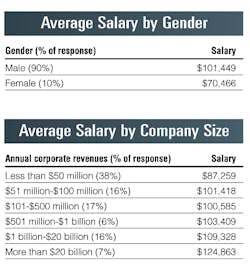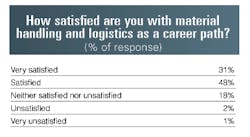Where the Money's At: MH&L's 2016 Salary Survey
"Industry salaries for the logistics management positions are still not as high as they should be. Logistics is still looked at as a necessary evil in some corporations, rather than a tool or opportunity to better position companies to compete with their competition, and achieve financial success." — logistics manager with a pharmaceutical/healthcare company with 31-35 years of experience, living in the South Atlantic region and earning $98,500
In this podcast, MH&L's Dave Blanchard discusses results of the 2016 Salary Survey, including where the highest salaries are being paid and how satisfied managers are with the field. This is the first episode in IndustryWeek's Manufacturing Voice podcast series, available for subscription on iTunes.
"Organizations need to look at how they are paying people. In the material handling industry there needs to be a share-the-wealth approach so that silos are broken down and people are encouraged to improve and grow. Too many organizations reward too few. A slightly smaller amount of a bigger pot is often more than some of a small pot."—business development manager with a transportation/warehousing company with 16-20 years of experience, living in the Middle Atlantic region and earning $82,000
"Logistics and supply chain has afforded me many opportunities and I have always been gainfully employed. It is a great field to have a career in and I would encourage anyone to pursue this as a career."—logistics manager with a transportation/warehousing company with 26-30 years of experience, living in the Middle Atlantic region and earning $105,000
Every year, as we compile the data that go into our annual MH&L Salary Survey, we focus on some key questions that go well beyond the dollars-and-cents breakdowns. One of those questions asks, "How satisfied are you with material handling and logistics as a career path?" A year ago, when we asked that question, 74% said they were either satisfied or very satisfied with their industry, which was an increase of 4% from the previous survey. This year, that percentage climbed again, by 5% this time, to 79%. So clearly, something is going very right within the material handling and logistics arena.
That's not to imply, of course, that there aren't trouble spots; as you'll learn from the charts and comments that accompany this report, there are plenty of problem areas that make coming to work, for some, a constant challenge that all too often is unrewarding and unfulfilling. But that being said, when we asked, "How satisfied are you with your current job?" 73% said they were either satisfied or very satisfied, which was up 2% from the previous year. This would seem to indicate that things are either getting better, or perhaps that respondents have lowered their expectations.
As we do every year, compiling these statistics gives us the opportunity to paint a portrait of what a "typical" material handling and logistics manager looks like. First of all, this person is a white male in his 50s, living in the Midwest with 21-25 years of experience in the industry, and working for a manufacturer of material handling equipment.
He has a C-suite position in corporate/executive management, has a four-year college degree, has worked at his current company for 6-10 years, received a raise last year between 1-3%, and did not earn a bonus. And finally, his annual salary is $98,440.
However, to state the obvious, there's nothing "typical" about a material handling and logistics professional. As we take a deeper dive into the Salary Survey metrics, we'll discover the many different types of people who make up this industry, and we'll hear open and honest (and anonymous) comments from your peers, as we seek to answer the oft-asked question, "So what do I have to do to make more money in this business?"
Gender Gap Widens Even More
"Women are not as valued as men. Their opinions don't seem to matter as much, but they are overutilized to get the job done."—female purchasing manager with a plastics/rubber products manufacturer with 26-30 years of experience, living in the North Central region and earning $40,000
"I'm a female so I'm sure males doing the same (or less important) jobs get paid better."—female business development manager with a plastics/rubber products manufacturer with 16-20 years of experience, living in the South Atlantic region and earning $98,000
"I think management underestimates the importance of my position and that I make things work fluidly without a lot of fuss and worry on their part. If I was to leave where I am now they would have to hire three people to do what I am doing. In light of that, they do not pay me for the actual job I am doing for them."—female warehouse/logistics manager with a consumer goods company with 16-20 years of experience, living in the South Atlantic region and earning $37,000
Unfortunately, for 10% of the industry, their earnings potential appears to be limited by their gender. It's hardly a secret that the material handling and logistics field is largely made up of men ("middle-aged white guys" is the not-infrequently-heard description of attendees at the major trade shows), and at the managerial level it's even rarer to find women. Even worse is the salary disparity, with men averaging $101,449 vs women averaging $70,466. That's not just a gap—it's a chasm.
"The traditional methods of advancing women aren't moving the needle," says Pat Milligan, global leader of Mercer's When Women Thrive research initiative, and the under-representation of women has become "an economic and social travesty." According to Milligan, "In ten years, organizations won't even be close to gender equality in most regions of the world. If CEOs want to drive their growth tomorrow through diversity, they need to take action today."
Last month, President Obama outlined a plan that would require all U.S. companies with 100 or more employees to report salaries based on gender, race and ethnicity. These rules, which would go into effect in 2017, could potentially open the floodgates to lawsuits based on compensation discrepancies. The material handling and logistics field in particular has a long way to go to reach anything close to gender neutrality when it comes to hiring and compensation practices.
The Nature of the Job
"The challenge we have is pressure to stabilize our rates while our labor costs are increasing, especially on the West Coast. Automation investments are rarely possible as we are not given a long enough time commitment from our customers to amortize the investment cost."—corporate/executive manager with a transportation/warehousing company with 26-30 years of experience, living in the Middle Atlantic region and earning $155,000
"For what I do I believe I am more than fairly compensated. I believe there will be a downsizing in the logistics industries and consolidation of companies. There is a real need for trained warehousemen and the workers compensation needs to be higher in order to retain good qualified employees to stay on the job. Their responsibilities have changed over the last 25 years and they are not just a grunt that pulls parts. They are warehousemen, inventory control, data entry, customer service and housekeeper all wrapped into one package."—supply chain manager with an energy/utilities company with 40+ years of experience, living in the South Central region and earning $115,000
"I have a feeling my salary is in the lower spectrum of my profession and even in my own company. Our younger generation doesn't have a good outlook for the logistics of our industry. Barcoding materials make the younger generation not have to learn what products really are or what they are used for, so it makes it difficult for them to advance."—sales/business development manager with a wholesaler/distributor with 21-25 years of experience, living in New England and earning $57,000
"Materials management is an exciting profession and it's offered me a rewarding and successful career for 40 years."—engineering manager with a material handling equipment manufacturer with 36-40 years of experience, living in the Middle Atlantic region and earning $62,000
For simplicity's sake, we group respondents to the Salary Survey into 20 different verticals (although even then, there are still some who don't fit into any of the industries listed on the form). At the top of the list, we find that 14% of all respondents work for a material handling equipment manufacturer, and earn an average salary of $98,398, which is amazingly close to the average salary of all respondents ($98,440).
The top-paying verticals, according to the survey, are construction/building equipment ($147,625), metals and metal products ($135,091), retail/trade ($134,608), and aerospace & defense ($124,396). If you're thinking of switching industries to elevate your income, based on sheer numbers the metals vertical appears to have the most opportunities, as 6% of all respondents come from that industry. The other three named represent 3% or fewer of the total response base.
Bringing up the rear as the lowest-paying verticals are plastics & rubber products ($64,903), 3PLs ($74,980), consulting/education ($75,200), and paper/printing/publishing ($79,667).
Geographically speaking, more material handling and logistics professionals live and work in the Midwest (33%) than any other region of the country, and perhaps for that reason they have the lowest average salary ($90,096). The highest average salary is found in the Pacific region ($119,486), where 10% of the industry resides.
Not surprisingly, if you're the boss, you've got the highest average salary, as corporate/executive managers earned $144,904. Supply chain directors/managers were next in line, with an average salary of $134,928, followed by transportation/fleet managers at $122,143. Inventory/materials managers tended to earn the least, with an average salary of $68,173, with purchasing/procurement managers earning slightly more at $69,150.
Education and experience both pay off, as you would expect. Those with only a high school diploma are earning an average of $73,198, while those with a master's degree or higher are averaging $122,403. By a similar yardstick, those just entering the material handling and logistics field, with 0-2 years of experience, are earning $59,488, while those who've been in the industry more than 40 years are averaging $126,481.
No Shortage of Challenges
"Government regulations, taxes and union demands continue to put pressures on our industry and many others. Frankly if the President, Congress, our state governments and unions do not recognize the pressure and demands they put on, they will continue to see industry move towards robotics/automation and the elimination of humans. No Humans = No Union Dues."—corporate/executive manager at a wholesaler/distributor with 26-30 years of experience, living in the Pacific region and earning $250,000
Although we received hundreds of responses to the open-ended question, "What is the biggest challenge facing the material handling and logistics industry today?" by far the most cited comments centered either on regulations (too much) and talent development (not enough). The industry's chances of achieving sustainable growth are hampered, many respondents feel, by a government too quick to point the finger at—and apply the boot to—companies that by their very nature consume large quantities of fuel and raw materials and that employ a lot of people. Equally troubling is the lack of interest many young people have in pursuing blue-collar jobs within the supply chain, a situation that sorely taxes the existing human resources at companies by asking the few to do the work of many. Our continuing coverage of both of these issues will shine the spotlight on emerging best practices that offer some hope for the future.
To sum it all up, then, if you've been taking notes, you'll have discovered that there are certain characteristics shared by the best-paid material handling and logistics professionals. If we exclude those traits that are difficult (although these days, not impossible) to change, such as race and gender, your salary is most likely to increase due to some or all of the following:
- Your experience
- Your education
- Where you live
- Industry vertical
- The size of your company
- Your level of authority.
Life within the supply chain is fraught with numerous challenges, headaches and scream-inducing moments of utter chaos… but many tell us it's the best job they've ever had, and they're quite satisfied with their career choices. And they're happier now than they've been in several years, so maybe there are even brighter days ahead.
--------------------
The Method to Our Madness
The MH&L 2016 Salary Survey was conducted online via e-mailed invitations to a select group of subscribers. The survey took place in December 2015-January 2016, with 403 responses. Respondents were not compensated, but were offered the opportunity to share their opinions and insights related to their jobs and their industry. All responses were anonymous.
The Rest of the Story
Go online to www.mhlnews.com/salarysurvey to find even more salary figures and charts from the MH&L 2016 Salary Survey, including a slideshow gallery of tables detailing responses to questions not featured in the print magazine. You can also read hundreds of open-ended comments from respondents about the biggest challenges confronting supply chain managers; the one thing they would like to change about their jobs; and their observations about the industry and their role within it. You can also access salary survey results from previous years, as well as related articles and commentary focused on workforce issues within the industry.
About the Author

Dave Blanchard
Senior Director of Content
During his career Dave Blanchard has led the editorial management of many of Endeavor Business Media's best-known brands, including IndustryWeek, EHS Today, Material Handling & Logistics, Logistics Today, Supply Chain Technology News, and Business Finance. He also serves as senior content director of the annual Safety Leadership Conference. With over 30 years of B2B media experience, Dave literally wrote the book on supply chain management, Supply Chain Management Best Practices (John Wiley & Sons, 2021), which has been translated into several languages and is currently in its third edition. He is a frequent speaker and moderator at major trade shows and conferences, and has won numerous awards for writing and editing. He is a voting member of the jury of the Logistics Hall of Fame, and is a graduate of Northern Illinois University.



